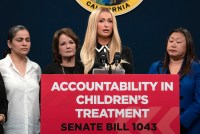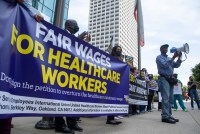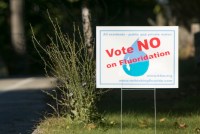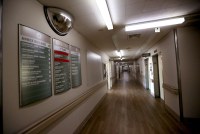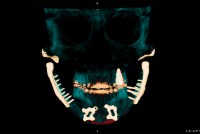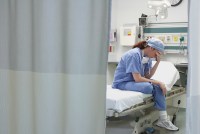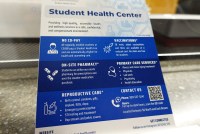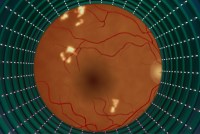Latest Morning Briefing Stories
Paris Hilton Backs California Bill Requiring Sunshine on ‘Troubled Teen Industry’
Celebrity hotel heiress Paris Hilton is expanding her campaign for more public reporting on residential therapeutic centers’ use of restraints and seclusion rooms in disciplining teens, setting her sights on legislation in Sacramento and Washington, D.C.
California Health Workers May Face Rude Awakening With $25 Minimum Wage Law
A medical industry challenge to a $25 minimum wage ordinance in one Southern California city suggests health workers statewide could face layoffs and reductions in hours and benefits under a state law set to begin phasing in in June. Some experts are skeptical, however, that it will have such effects.
Más condados prohíben el fluoruro en el agua potable. Cómo afecta a la prevención dental
En los últimos años cientos de comunidades han dejado de agregar fluoruro a sus suministros de agua o han votado para evitar agregarlo, a pesar que la ciencia dice que ese nutriente ayuda a la salud dental y previene gastos en tratamientos dentales.
As Bans Spread, Fluoride in Drinking Water Divides Communities Across the US
The broad availability of over-the-counter dental products containing fluoride has some community leaders arguing that its addition to public drinking water is no longer necessary. But public health experts worry that, much like vaccines, fluoridation may be a victim of its own success.
California Fails to Adequately Help Blind and Deaf Prisoners, US Judge Rules
Thirty years after prisoners with disabilities sued and 25 years after a federal court first ordered accommodations, a judge found that California prison and parole officials still are not doing enough to help deaf and blind prisoners — in part because they are not providing readily available technology such as video recordings and laptop computers.
After Uphill Battle, Company Is Poised for Takeover of Bankrupt California Hospital
American Advanced Management, a steadily growing operator of small hospitals, is expected to get the green light from a bankruptcy court next week to take over the shuttered Madera Community Hospital. Some community groups worry about the company’s track record.
Dietary Choices Are Linked to Higher Rates of Preeclampsia Among Latinas
Researchers at the USC Keck School of Medicine found that Latinas who ate vegetables, fruits, and healthy oils-based foods had fewer incidences of preeclampsia. More research is needed to determine the exact diet that could be beneficial.
El tipo de alimentación está vinculado a tasas más altas de preeclampsia en latinas
No hay una forma de curar o predecir la preeclampsia. La enfermedad puede dañar el corazón y el hígado, y causar otras complicaciones tanto para la madre como para el bebé, incluido el parto prematuro e incluso la muerte.
The Horrors of TMJ: Chronic Pain, Metal Jaws, and Futile Treatments
TMJ disorders affect as many as 1 in 10 Americans and yet remain poorly understood and ineffectively treated. Many common treatments used by dentists lack scientific evidence.
Attacks on Emergency Room Workers Prompt Debate Over Tougher Penalties
In California, assaulting paramedics or other emergency medical workers in the field carries stiffer fines and jail time than assaulting emergency room staffers. State lawmakers are considering a measure that would standardize the penalties.
Heat Protections for California Workers Are in Limbo After Newsom Abandons Rules
Proposed rules to protect millions of workers from potentially dangerous heat inside workplaces are dead after Gov. Gavin Newsom’s administration refused to sign off. Labor advocates and state regulators are calling for emergency regulations before temperatures soar this summer.
California Universities Are Required to Offer Abortion Pills. Many Just Don’t Mention It.
One year after California became the first state to require public universities to provide abortion pills to students, LAist found that basic information for students to obtain the medication is often nonexistent.
California Is Expanding Insurance Access for Teenagers Seeking Therapy on Their Own
A California law that takes effect this summer will grant minors on public insurance the ability to get mental health treatment without their parents’ consent, a privilege that their peers with private insurance have had for years. But the law has become a flashpoint in the state’s culture wars.
Emergency Physicians Decry Surprise Air-Ambulance Bills
Emergency room doctors say insurers are increasingly declining to cover costly air-ambulance rides for critically ill patients, claiming they aren’t medically necessary. And the National Association of EMS Physicians says the No Surprises Act, enacted in 2022, is partly to blame. The law protects patients from many out-of-network medical bills by requiring insurers and providers […]
Programas de inteligencia artificial diagnostican retinopatía diabética en minutos
En medio de todo el revuelo en torno a la inteligencia artificial en la atención médica, la tecnología de exámenes de la vista está surgiendo como uno de los primeros casos de uso probados de diagnósticos basados en IA en un entorno clínico.
As AI Eye Exams Prove Their Worth, Lessons for Future Tech Emerge
With artificial intelligence in health care on the rise, eye screenings for diabetic retinopathy are emerging as one of the first proven use cases of AI-based diagnostics in a clinical setting.
A Mom’s $97,000 Question: How Was Her Baby’s Air-Ambulance Ride Not Medically Necessary?
There are legal safeguards to protect patients from big bills like out-of-network air-ambulance rides. But insurers may not pay if they decide the ride wasn’t medically necessary.
California’s Expanded Health Coverage for Immigrants Collides With Medicaid Reviews
A state policy to extend Medi-Cal to qualified Californians without legal residency is running up against a federal requirement to resume eligibility checks. The redetermination process is causing many Latinos, who make up a majority of Medi-Cal beneficiaries, to be disenrolled.
Move to Protect California’s Indoor Workers From Heat Upended by Cost Questions
A years-long process that would have created heat standards for California workers in warehouses, steamy kitchens, and other indoor job sites catapulted into chaos Thursday when Gov. Gavin Newsom’s administration pulled its support. Regulators, saying they felt “blindsided,” approved the regulation anyway. It’s unclear what happens next.
Needle Pain Is a Big Problem for Kids. One California Doctor Has a Plan.
The pain and trauma from repeated needle sticks leads some kids to hold on to needle phobia into adulthood. Research shows the biggest source of pain for children in the health care system is needles. But one doctor thinks he has a solution and is putting it into practice at two children’s hospitals in Northern California.



